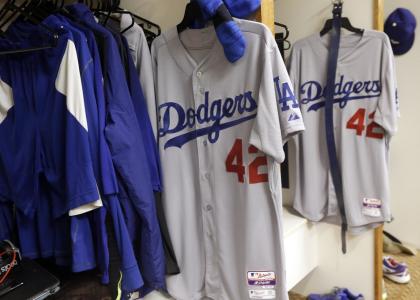MLB's only black manager pauses to remember Jackie Robinson's impact
LOS ANGELES – If not a bridge in Selma, then a bus in Montgomery, a lunch counter in Greensboro, a ballpark in Brooklyn, or on a thousand streets in a hundred towns.
It is worth the thought, "Who would I have been then?"
Lloyd McClendon, 56-year-old manager of the Seattle Mariners, star in 1971 of what is believed to be the first all-black team to reach the Little League World Series, product of the tough, steel town of Gary, Ind., pushed his chair back slightly.
"Hmm," he said. "That's a great question. Yeah, I have given it a lot of thought. I'm not sure I want to share that with you. But I will say this: My mom always thought I was going to be a preacher."
He laughed and drew a crackling spirituality into his voice, "Probably fire and brimstone more than anything."
He is the only black manager in Major League Baseball. African-Americans make up less than 10 percent of big-league rosters.
This is who he is.
On Tuesday afternoon, the day before his Seattle Mariners and the Los Angeles Dodgers would play the Civil Rights Game at Dodger Stadium and honor the 68th anniversary of Jackie Robinson breaking baseball's color barrier, McClendon sat in the bare visiting manager's office. Behind him, on a white wall, were 24 black-and-white photos, stacked in threes and eight across, framed in black. Most were great managers. Connie Mack was up there. Tony La Russa, Earl Weaver, Tommy Lasorda, Walter Alston, Sparky Anderson, Joe Torre and Leo Durocher, too.
All white, it was observed.
Without turning in his chair, McClendon said, "Not all of them."
In the top row, in among the legendary managers whose names everyone knows, there was one other – a black man reclined in a wooden chair. He held what appeared to be a program in his left hand. He wore a three-piece suit and a newsboy cap, looking quite serious.
"Rube Foster," McClendon said. "He did it all."
A pitcher of merit a century ago, Foster helped build what became the Negro Leagues. He was a manager, an executive and an owner.
"A pretty bright guy," McClendon said.
When it was suggested he could indeed be in the Hall of Fame, McClendon said, "1981," the way some rattle off their own birthday.

They'll all wear No. 42 on Tuesday, every single one of them, and if you fear it's become just a busy day on the calendar for the tailors, take a few minutes with McClendon, who was born three years after Jackie Robinson retired. As a boy, McClendon knew well the legend of Robinson, and then played eight seasons in the major leagues. He managed the better part of five seasons for the Pittsburgh Pirates, when Frank Robinson was managing the Montreal Expos and Washington Nationals. Thirty years earlier, Robinson had become baseball's first black manager.
"Obviously being a young man that had an opportunity to play Little League and fell in love with the game," he said, "who aspired to one day be Jackie Robinson on the playing field – I came up a little short – but in some ways I hope I'm making him proud. It's certainly an honor to be here and be able to wear No. 42. Hopefully I'll do him proud tomorrow."
In his clubhouse, amid the next generation, Taijuan Walker would be the starting pitcher Wednesday. The son of a black man and a Mexican and white mother, Walker is 22, talented and thoughtful. He said he'd done some reading on Robinson and was enthralled by the recent movie of his life, "42."
"I thought it was incredible," Walker said.
The notion that a man – any man – could stand at first base at Ebbets Field not seven decades ago and have the world find it extraordinary is, perhaps, inconceivable to a 22-year-old. It's why those 42s on those fields will be meaningful Wednesday, and why those 42s on those ballpark facades are meaningful every day, so that a young man such as Taijuan Walker can know there once was another young man who was first.
Baseball retired the number in 1997. Walker was 4. Ken Griffey Jr. began the trend of the entire sport setting aside its personal numbers for Jackie's in 2009. Walker was 16.
"It's something I've been waiting to do for a long time, since I started playing baseball," said Walker, who growing up leaned more to football and basketball. "It means a lot to me."
So who would he have been then? As much as he hoped he'd be?
He looked off, shrugged his shoulders. It's a lot to consider, a lot to be honest with.
"I don't know," he said finally. "I have not thought about that at all. It is something I should think about."
More MLB coverage:

 Yahoo Sports
Yahoo Sports 